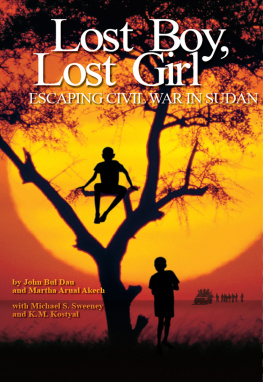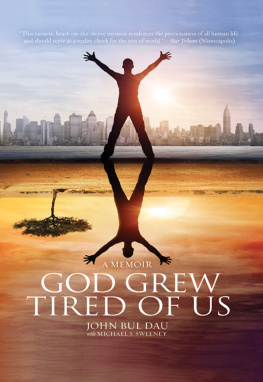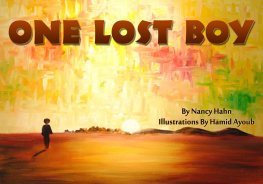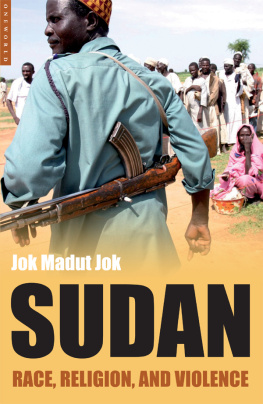To our lovely Children; Agot, Leek, and our three-day-old daughter, Akur. This book is dedicated to you. When you are able to read on your own, it should act as an introduction to the ordeals that your mother and I went through. You are sweet kids, and we thank Almighty God for keeping us alive during the war, a time when we never thought we would survive to even have children! j&m
To all of the other lost children in the world, whose stories have not been told kmk
John
W hen I was a young boy, my great-uncle Aleer-Manguak was killed while trying to protect our cattle from a lion. His bravery made me proud.
My people, the Dinka, raise cows in Southern Sudan. We like to drink their milk, and we use them as a form of money. Protecting our precious cows from predators is a constant problem. Sometimes we must kill or be killed.
One day five lions sneaked into the pastures near Paguith, my first village. Lions are smart and work in groups. If they want to attack a herd, they first try to make the cows panic. They sometimes do this by creeping near the cattle and spreading their urine on the ground. Then they quietly move to the opposite side of the herd. When the cows wander far enough to sniff the odor of lion urine, they know a killer is nearby and run in the opposite directionright toward the waiting lions. This is exactly what happened that day. Hundreds of cows ran into the trap, and two fell to the lions fangs and claws. My brother and some other Dinka boys saw what happened and tried to chase the lions away. They ran at the lions and threw sticks to drive them from their kill. That just made the lions angry. Some of them turned on the boys, and they had to run for their lives.
The boys hurried to the village and alerted everyone that lions had attacked the cattle. The women of the village began to shout, and the men began to arm themselves. My father and great-uncle got their knives and spears and left their houses to meet the other men of the village. They quickly decided to form a hunting party. They would have gone after the lions right then, but night had begun to fall and they had to suspend their pursuit. Everyone went to bed anxious for the hunt to begin. After the sun rose the next morning, a hunting party that had special skills in tracking lions began to follow their path. About thirty men, all armed with spears, set off after the trackers through the tall grass.
By the time they found the lions, two had run off, but three remained in the thick grass and brush. The hunters circled them and began to walk toward each other, drawing the circle smaller and smaller. Two of the three lions didnt want anything to do with the Dinka hunters and escaped through gaps in the circle. That left one. He was a big male with a broad face and a golden mane.
Remember how I said lions are smart? This one certainly was. He did not want to tangle with humans and was trying to keep his distance, but the shrinking circle gave him no chance to flee. The lion began to get nervous. To get close enough to actually kill the lion, the hunters needed to create a distraction. The Dinka say, Who is going to bring the lion? It is a special kind of job. The bringer stabs the lion to make it angry. The lion then chases its attacker, who runs for his life. The fastest runners in the village train to bring the lion. My great-uncle was one of them.
As the men of my village knelt with their spears pointed at the center of the circle, Aleer-Manguak and another runner rushed straight at the lion. As they sped by, they stabbed the great beast with the tips of their spears. The lion roared in anger and pain. It rose on all four legs and chased Aleer-Manguak. The beast caught him just as he reached the circle of hunters. It swiped at him with one paw, tearing open his shoulder and breaking his ribs. The other hunters swarmed over the lion and pierced its flesh with their spears, killing it quickly. My great-uncle lived just a little while longer, and then he died too.
The entire village honored my great-uncle. The hunters took the lions body and cut off the tail, paws, and mane. They gave these to Aleer-Manguaks family as tokens of respect for his brave deed and his self-sacrifice. The family hung the prizes in their luak, a round Dinka cattle pen with a thatched roof.
Even as a boy of seven or eight, I knew why everyone honored Aleer-Manguak in death. Almost from birth, a child is taught the values of the Dinka, which my great-uncle had in abundance. These values include respect, courage, hard work, and self-sacrifice. A Dinka child is also taught to fight for family, village, tribe, and country. The strongest fighters are those who keep two rules. First, they never, ever give up, no matter what the odds are against them. And second, like the lions, they work together. A Dinka man who follows these rules and maintains the values he learned as a boy can grow up to be a great leader, like my great-uncle. At the time I had no idea how much I would have to live by these rules just to survive the ordeals of my life. Aside from the occasional marauding visit by a lion or hyena, my childhood years were peaceful and fun.
Nobody kept exact records in Southern Sudan, but my family believes that I was born in July 1974. My father was Deng Leek Deng Aleer. He had been a mighty wrestler when he was young and later became a judge. He did not go to school to learn the law. Instead, we Dinka say that he held the laws in his heart. He knew our traditions and our values and was called upon to settle disputes. He disciplined me severely when I was young, especially if I showed any disrespect. At the time I thought he was too strict, but now I realize that he was raising me to be strong, as a Dinka man should be.
My mother was Anon Manyok Duot Lual. She was the daughter of a Dinka chief and was considered quite an excellent bride. My father had to pay many cows to her male relatives as a sign of his respect before he could marry her and give their children his name. It is common among the Dinka for a man to have more than one wife. After my father married my mother, he took three more wives, and he had many children. I am the youngest son of my mother.
Like all good Dinka, my family raised cattle. These are not the cows you see on North American farms. Dinka cows look wilder than their American cousins and have thick horns that are two to three feet long. Their milk is sweet, and we drink it all the time. We slaughter a cow for its meat only to mark a big occasion. We believe that cows are a gift from God.
Our legends say that God offered the first Dinka man a choice between the gift of the first cow and a secret gift, called the What. God told the first man to carefully consider his choice. The secret gift was very great, God said, but he would not reveal anything more about it. The first man looked at the cow and thought it was a very good gift. If you insist on having the cow, then I advise you to taste her milk before you decide, God said. The first man tried the milk and liked it. He considered the choice and picked the cow. He never saw the secret gift. God gave that gift to others.
The Dinka believe that the secret gift went to the people of the West. It helped them invent and explore and build and become strong. Meanwhile, the Dinka never built factories or highways or cars or planes. They were content to be farmers and cattle raisers. They lived happily for centuries, drinking milk and using cows as currency. Cows remain the lifeblood of the Dinka culture.







